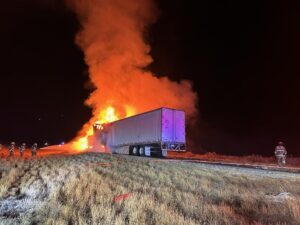ALEXANDRIA, Va. — The American Trucking Associations (ATA) and NATSO, which represents truck stops and travel plazas across the nation, are urging state and local governments to carefully consider the operational differences of essential businesses when implementing social-distancing guidelines to ensure that truck stops and travel plazas can safely serve commercial drivers without delaying the delivery of critical emergency relief supplies during the COVID-19 pandemic.
In its “Guidance on the Essential Critical Infrastructure Workforce,” the Cybersecurity and Infrastructure Security Agency (CISA) includes truck-stop workers and commercial truck drivers on the list of “essential critical infrastructure workers.”
However, many local officials are exceeding the Centers for Disease Control and Prevention’s (CDC) recommended social-distancing guidelines and enforcing strict occupancy limits in travel centers, severely delaying commercial drivers when they stop for food or fuel. Notably, some localities are enforcing occupancy limits of as few as five to 10 people, including employees, in these businesses. In certain parts of the country, this is resulting in drivers waiting in long lines to enter nearly empty truck stops to purchase food and use the facilities. These waits extend their delivery time for transporting goods in support of COVID-19 relief efforts.
Truck stops and travel plazas frequently have a very large footprint and can average 28,000 square feet, offering ample space to safely serve truck drivers within the 6-feet social-distancing guidelines issued by the CDC without imposing extreme caps on the number of customers in a location at one time.
“Varying interpretations of the CDC guidelines are creating exceedingly long wait times for truck drivers to buy food, use the facilities and get back on the road, hindering their ability to deliver medical supplies or keep grocery store shelves stocked,” said NATSO President and CEO Lisa Mullings. “What should be 20-minute stops are turning into more than two-hour layovers. It is imperative that local enforcement officials enforce occupancy caps in truck stops in a manner that adheres to CDC social-distancing guidelines without unnecessarily disrupting the efficient movement of essential supplies throughout the country.”
NATSO and ATA expressed their concerns in a letter to the National Association of Counties; National Association of County and City Health Officials; the National League of Cities; and the United States Conference of Mayors.
“Each day during this pandemic, truck drivers are out on the road making critical deliveries to markets, hospitals and consumers. If local governments impede them from making those deliveries, they are putting lives at risk,” said ATA President and CEO Chris Spear. “We urge officials at all levels of government to help our industry keep those deliveries rolling by keeping facilities open and accessible for drivers to use in a safe and efficient manner.”
The travel plaza and truck stop industry is taking every precaution to protect the health and safety of its employees and customers. They continue to follow all recommended guidelines issued by the CDC and World Health Organization (WHO). As part of the supply chain, truck stops are committed to doing their part to keep truck drivers safe and on the road.
“At Pilot Co., our top priority is protecting the safety of our team members and guests, while continuing to provide essential services and goods to keep America moving,” said Pilot Co. CEO Jimmy Haslam. “With professional drivers moving more than 70% of the goods consumed in the U.S., it is imperative that we keep our travel centers open, while following health and social-distancing guidelines, to ensure the movement of supplies throughout the country. The entire trucking industry is taking every precaution to ensure the health and safety of professional drivers on the road.”
Frank Love, co-CEO of Love’s Travel Stops expressed concern about delays caused by some state and local restrictions.
“The professional driver’s ability to deliver essential products to Americans from coast to coast in a timely manner is extremely important in the fight against COVID-19,” Love said. “Due to some state and local mandates, we have experienced issues that have created long delays for these professionals that have put their deliveries at risk. Any relief for these men and women would be greatly appreciated.”
The Trucker News Staff produces engaging content for not only TheTrucker.com, but also The Trucker Newspaper, which has been serving the trucking industry for more than 30 years. With a focus on drivers, the Trucker News Staff aims to provide relevant, objective content pertaining to the trucking segment of the transportation industry. The Trucker News Staff is based in Little Rock, Arkansas.











